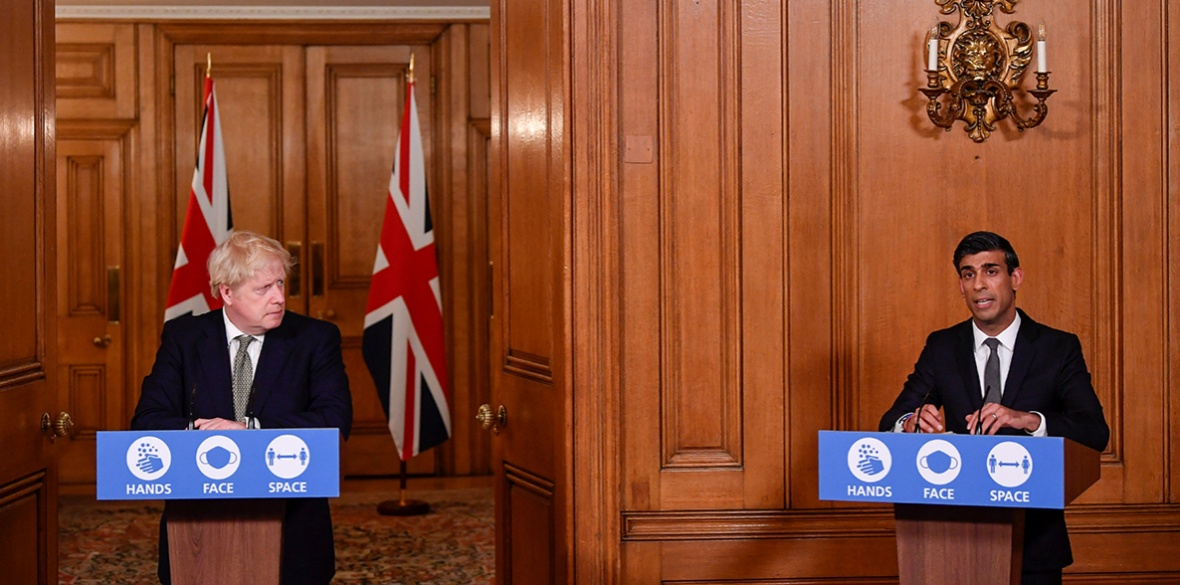RISHI SUNAK may claim his “absolute priority” is trying to protect as many jobs as possible, but new statistics show the biggest summer increase in joblessness since the financial crash.
The government’s gimmicky response to the collapse in market demand for certain roles because of pandemic restrictions is epitomised by the dire “rethink, reskill, reboot” ad advising a ballet dancer to “work in cyber” and an online careers advice questionnaire widely likened to a Buzzfeed quiz. Both have met near universal derision.
Sunak’s sincerity in asserting that “everyone’s having to adapt” should be tested by a challenge to the government to drop its fixation with throwing money at the private sector and face up to the ways the current crisis expose an unsustainable economic model.
The Tories won’t do that, of course. Nor is Labour proposing it. The opposition have become bolder in challenging the government — but mainly in pushing for more money for local authorities and support schemes rather than questioning its fundamental approach.
The reason is that Parliament remains dominated by career-politicians wedded to the neoliberal model pursued by all British governments since the 1970s — that rejects any serious restrictions on the freedom of “the market.”
This encompasses differing views on how much public money the state should be prepared to spend, but fundamentally views the state as a purchaser of services rather than a provider — hence billions spent on contracts for private-sector health contracts, incentives of varying effectiveness for businesses to retain staff and a refusal to consider the nationalisation and reshaping of stricken sectors as a way of “adapting” to the new reality.
Ultimately Sunak and his colleagues represent Britain’s ruling class and we cannot expect the government to listen to advice except where it suits the interests of that class.
This is why all government measures are designed to be temporary, consisting of cash-flows to local authorities and businesses that can be switched on or off.
It cannot risk creating a “new normal” people prefer to the old in case this leads to permanent change.
So the 10-point plan for safe school reopening proposed months ago by the National Education Union, that involved requisitioning additional spaces to allow socially distanced learning and a mass teacher recruitment drive to facilitate the correspondingly smaller class sizes, was not just rejected but ignored.
The proposals would have employed large numbers while keeping children safe. The downsides were that teachers and parents would not want to return to Britain’s abnormally large class sizes afterwards, meaning governments would have to invest more in education, and the requisitioning of space for social use would act as a precedent for this to be done to tackle other problems — such as homelessness.
So school returned with minimal alterations to pre-pandemic circumstances and Public Health England now recognises that Covid-19 infection rates are higher for people between 10 and 19 years old than for any other age group. (The picture is similar in Scotland, as education union NASUWT pointed out this week.)
The labour movement needs to act to undermine the government’s determination to keep public debate within neoliberal lines.
The change in Labour leadership this year, installing a top team committed to the status quo at a time when it is palpably incapable of meeting social need, must be compensated for by demands from the trade union movement itself.
Yet Sunak has heard plenty of demands. Appeals to the decency of the government are laughable. Appeals to its common sense imply a non-existent common interest between working-class people and the monopoly capitalist class.
Just as local government leaders are co-ordinating for a new approach through the Alliance for Full Employment, the devastation faced by many communities and cities facing mass joblessness must prompt unions to mount joint action at local level to change the game, with the reinvigoration of trades councils an essential step.











